
Waylon Arnold Jennings was an American singer, songwriter, musician, and actor. He is considered a chief pioneer of the outlaw movement in country music, and was one of the most commercially successful country artists from the late 1960s to the late 1980s, with a string of number one hits and critically acclaimed albums following his rebellion against the conservative Nashville recording industry.

Edward Kelly was an Australian bushranger, outlaw, gang leader and convicted police-murderer. One of the last bushrangers, he is known for wearing a suit of bulletproof armour during his final shootout with the police.
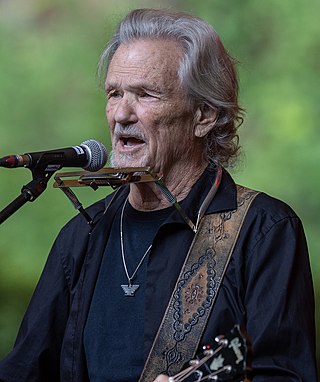
Kristoffer Kristofferson is an American retired country singer, songwriter and actor. Among his songwriting credits are "Me and Bobby McGee", "For the Good Times", "Sunday Mornin' Comin' Down", and "Help Me Make It Through the Night", all of which were hits for other artists.

David Allan Coe is an American singer and songwriter. Coe took up music after spending much of his early life in reform schools and prisons, and first became notable for busking in Nashville. He initially played mostly in the blues style, before transitioning to country music, becoming a major part of the 1970s outlaw country scene. His biggest hits include "You Never Even Called Me by My Name", "Longhaired Redneck", "The Ride", "Mona Lisa Lost Her Smile", and "She Used to Love Me a Lot".
Outlaw country is a subgenre of American country music created by a small group of iconoclastic artists active in the 1970s and early 1980s, known collectively as the outlaw movement, who fought for and won their creative freedom outside of the Nashville establishment that dictated the sound of most country music of the era. Willie Nelson, Waylon Jennings, Merle Haggard, Johnny Cash, Kris Kristofferson, Johnny Paycheck and David Allan Coe were among the movement's most commercially successful members.
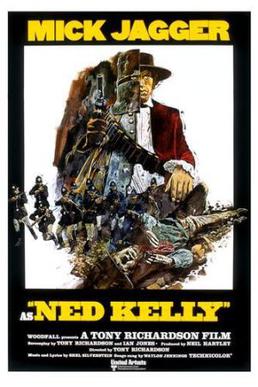
Ned Kelly is a 1970 British-Australian biographical bushranger film. It was the seventh Australian feature film version of the story of 19th-century Australian bushranger Ned Kelly, and is notable for being the first Kelly film to be shot in colour.

Waylon Albright "Shooter" Jennings is an American musician and record producer. He is the son of country singers Waylon Jennings and Jessi Colter. In a career spanning three decades, Jennings has explored a variety of musical genres.
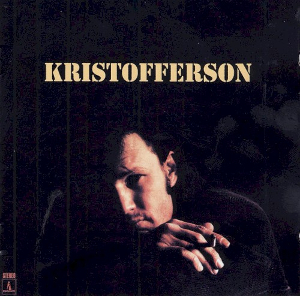
Kristofferson is the debut album by the singer-songwriter Kris Kristofferson. It was produced by Fred Foster and released in June 1970 by Monument Records. After working a series of temporary jobs, Kristofferson became a helicopter pilot for oil companies in the Gulf of Mexico. While he worked, he wrote songs and pitched them to singers around Music Row in Nashville, Tennessee during his free time. Kristofferson's songs were recorded by country singers Roy Drusky, Jerry Lee Lewis and Roger Miller and later he persuaded Johnny Cash to try his material. Cash invited Kristofferson to perform with him at the Newport Folk Festival, after which Fred Foster signed Kristofferson to Monument Records as a songwriter and recording artist.

The Legend is a box set by country singer Johnny Cash, released in 2005 on Columbia Records and Legacy Recordings. It is one of the few multi-disc sets that contain songs recorded throughout Cash's entire career, from 1955 to 2003. Over four CDs, most of Cash's biggest hits are covered, in addition to numerous traditional compositions Cash recorded versions of, and several collaborations with other known artists, including Rosanne Cash, U2 and Bob Dylan. In keeping with Cash's persona as the Man in Black, the data surface of the discs is black. In 2006, the set won the Grammy Award for Best Boxed or Special Limited Edition Package. It was certified Gold on January 11, 2006, by the RIAA.
Ned Kelly (1854–1880) was an Australian bushranger, outlaw, gang leader and convicted police murderer.
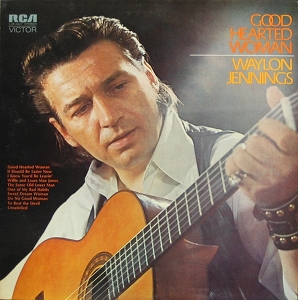
Good Hearted Woman is a studio album by American country music artist Waylon Jennings, released in 1972 on RCA Nashville.

Lonesome, On'ry and Mean is a studio album by American country music artist Waylon Jennings, released on RCA Victor in 1973. It was, after Good Hearted Woman and Ladies Love Outlaws, the third in a series of albums which were to establish Jennings as one of the most prominent representatives of the outlaw country movement. Like its successor, Honky Tonk Heroes, the album is considered an important milestone in the history of country music. It represented the first of Jennings' works produced and recorded by himself, following his fight for artistic freedom against the constraints of the Nashville recording establishment.

Honky Tonk Heroes is a country music album by Waylon Jennings, released in 1973 on RCA Victor. With the exception of the final track on the album, "We Had It All", all of the songs on the album were written or co-written by Billy Joe Shaver. The album is considered an important piece in the development of the outlaw sub-genre in country music as it revived the honky tonk music of Nashville and added elements of rock and roll to it.

The Lady's Not For Sale is a 1972 album by Rita Coolidge, and was released on the A&M Records label, AMLH 64370. It was later reissued on the Music For Pleasure label, MFP-50500. The inner gatefold photo was shot on location by Terry Paul at Stonehenge in the English county of Wiltshire.

Help Me Make It Through the Night is the debut studio album released by American country artist Sammi Smith. The album was originally released in September 1970 on Mega Records and was produced by Jim Malloy. The album was originally named He's Everywhere but was renamed Help Me Make It Through the Night due to the popularity of that track, which reached number one on the Billboard country music chart and the Top 10 on the Billboard Hot 100 chart. The album comprised Smith's first recordings for the Mega label.

Ned Kelly was a 19th-century Australian bushranger and outlaw whose life has inspired numerous works in the arts and popular culture, especially in his home country, where he is viewed by some as a Robin Hood-like figure.

Stephen Ackles was a Norwegian vocalist, pianist, and songwriter who mainly played rock 'n' roll inspired by Jerry Lee Lewis, Chuck Berry, Little Richard, and Elvis Presley. His mother, Bergliot Kittilsen, was Norwegian, and his father, Allan Dale Ackles was American.
Ron Haffkine was an American record producer, composer and music manager most recognized for his work as a producer and manager of Dr. Hook & the Medicine Show, an American rock band, producing hit singles including "Sylvia's Mother", "The Cover of Rolling Stone", "Sharing the Night Together", "A Little Bit More" and "When You're in Love with a Beautiful Woman" and achieving 67 Gold and Platinum records.
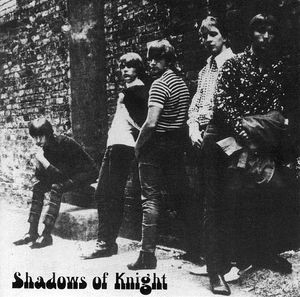
Raw 'n' Alive at the Cellar, Chicago 1966! is a live album by the American garage rock band the Shadows of Knight, and was released on Sundazed Records in 1992. The album consists of recordings from the band's appearance at the Cellar in Arlington Heights, Illinois in December 1966. Although the tapes were never anticipated to be released publicly, Raw 'n' Alive at the Cellar is commended for its good sound quality, and represents one of the better live concert recordings to emerge from the garage rock era.

Stringybark Creek is a small creek in the Wombat Ranges, Victoria, Australia. It is famous for the place where three policemen were murdered on the 28 of October 1878. The policemen, Sergeant Michael Kennedy, Constable Thomas Lonigan, and Constable Michael Scanlan were searching the forest for the Kelly brothers, Ned and Dan Kelly. They were wanted for the attempted murder of another policeman, Constable Fitzpatrick.


















